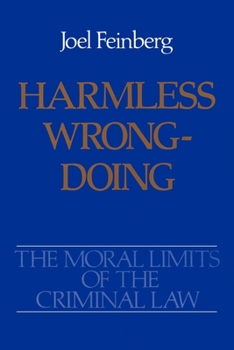Harmless Wrongdoing
Select Format
Select Condition 
Book Overview
The final volume of Feinberg's four-volume work, The Moral Limits of Criminal Law examines the philosophical basis for the criminalization of so-called "victimless crimes" such as ticket scalping, blackmail, consented-to exploitation of others, commercial fortune telling, and consensual sexual relations.
Format:Paperback
Language:English
ISBN:0195064704
ISBN13:9780195064704
Release Date:May 1990
Publisher:Oxford University Press
Length:416 Pages
Weight:1.35 lbs.
Dimensions:1.0" x 6.0" x 9.0"
Customer Reviews
1 rating
Illegal but Not Immoral? Oh, Really?
Published by Thriftbooks.com User , 14 years ago
Ever wonder why some things are illegal and others regarded as just immoral? Or why various things that are nowhere close to immoral are nonetheless illegal? Call me weird, but I think about that stuff all the time. Well finally, finally I've found a book that deals head-on with those issues, and published more than twenty years ago, it turns out, so I'm clearly late to the party, but better late than no party at all. Actually, it takes all four volumes of the late philosopher Joel Feinberg's masterpiece, The Moral Limits of the Criminal Law, to fully treat such a ripe topic, and I'm not necessarily pledging to sign on for the whole ride. But his vol. 4, Harmless Wrongdoing, gets more to the essence of it than any other single source I know. Also, because this is the concluding volume, it begins by summarizing in roughly twenty pages what came before and is where the author chooses to deal with the most ambivalent and difficult issues. After all, harming or deeply offending our fellow humans, as per vols. 1 and 2, should be illegal and are, almost everywhere; that's what criminal law is for. A bit more dubious, per vol. 3, are laws to prevent us from harming ourselves, but in Harmless Wrongdoing we come to things like ticket scalping, prostitution, and the famous paradox of blackmail that seem to vex legal systems the world over. For instance, if I can legally pay you to go out on a street corner and say things about me that are provably true (or not), why can't you ask to be paid for refraining from saying things about me that are provably true (or not)? Yet almost universally, the latter act is viewed as immoral, and in most places is a criminal matter as well. Absent coercion, though, aren't they essentially equivalent transactions, which in the former case even fulfills a standard business function: advertising? And why wouldn't tort claims for malicious mischief, invasion of privacy or libel under civil law take care of abuses in the latter case without resort to criminal prosecution? Seems simple, right, but as the saying goes, tell it to the judge. Or better yet, listen to Feinberg. Not that he agrees with criminalization of un-coerced blackmail, or of other seemingly standard transactions like prostitution or ticket scalping between consenting adults, assuming they are un-coerced, but he certainly helped me get my head around why they often are criminalized. Moreover, he suggests good, principled arguments for advocating that such laws be changed. Of course, I admitted up front that for some reason I love thinking about this stuff, but read Harmless Wrongdoing and maybe you will too. Also consider yourself lucky that Joel Feinberg spent a lifetime thinking about it and left behind such an excellent book of markers for rational law making. Now we need a lot more people to read it, toward which this review is perhaps one small step.





